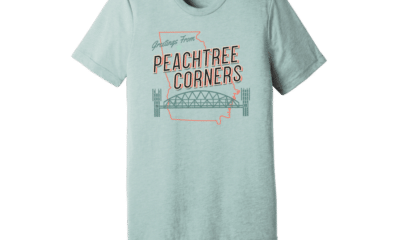Sports
Q & A: The Strong Comeback of Autumn Clark (article)
Published
4 years agoon
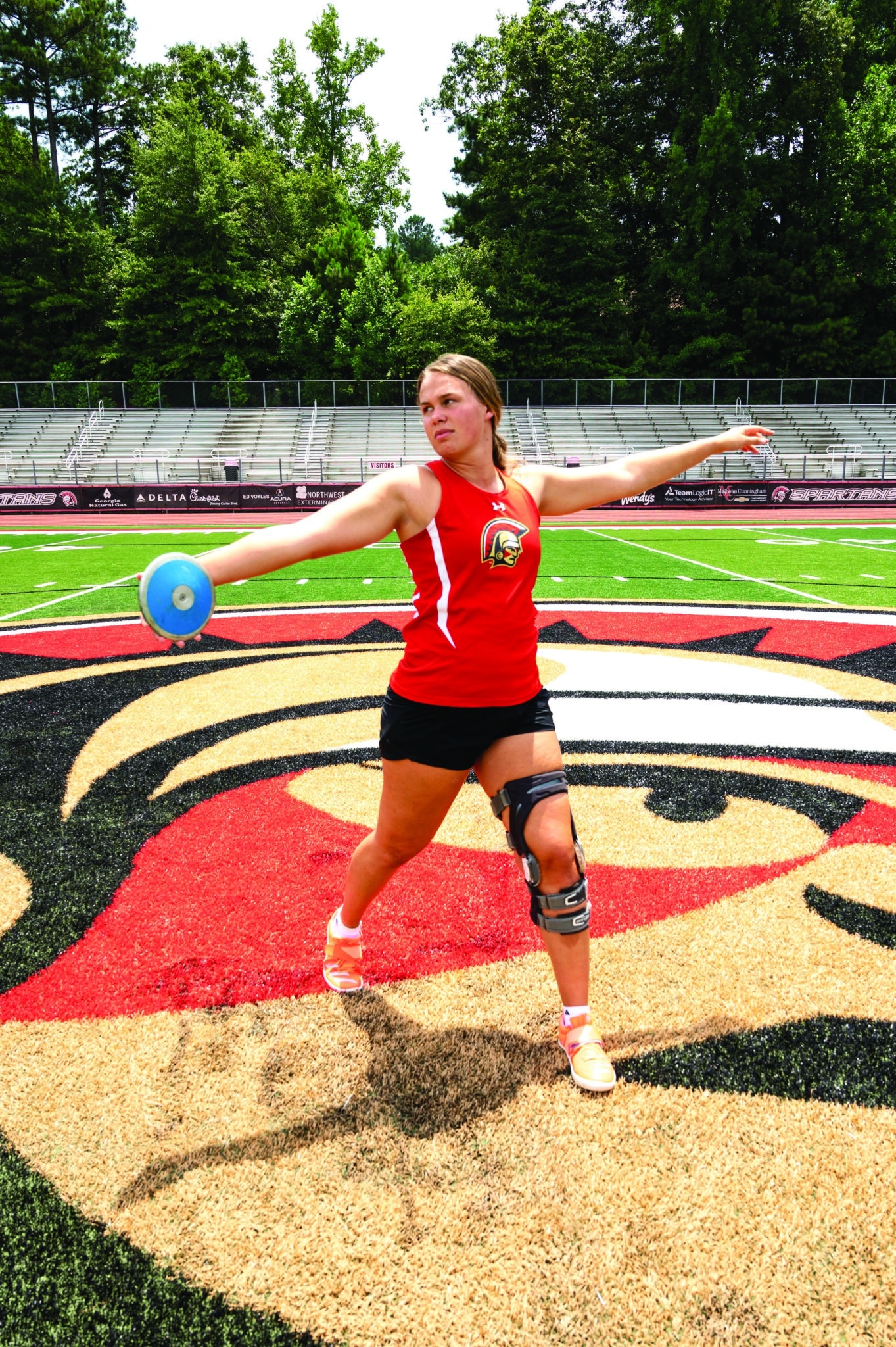
Photos by George Hunter.
Autumn Clark, a student at Greater Atlanta Christian School (GAC), is a gifted athlete who has worked tenaciously to develop her talents. More than a year ago, she suffered an injury which sidelined her for a while — but not for long. She powered through her rehab and had returned stronger and more determined than ever.
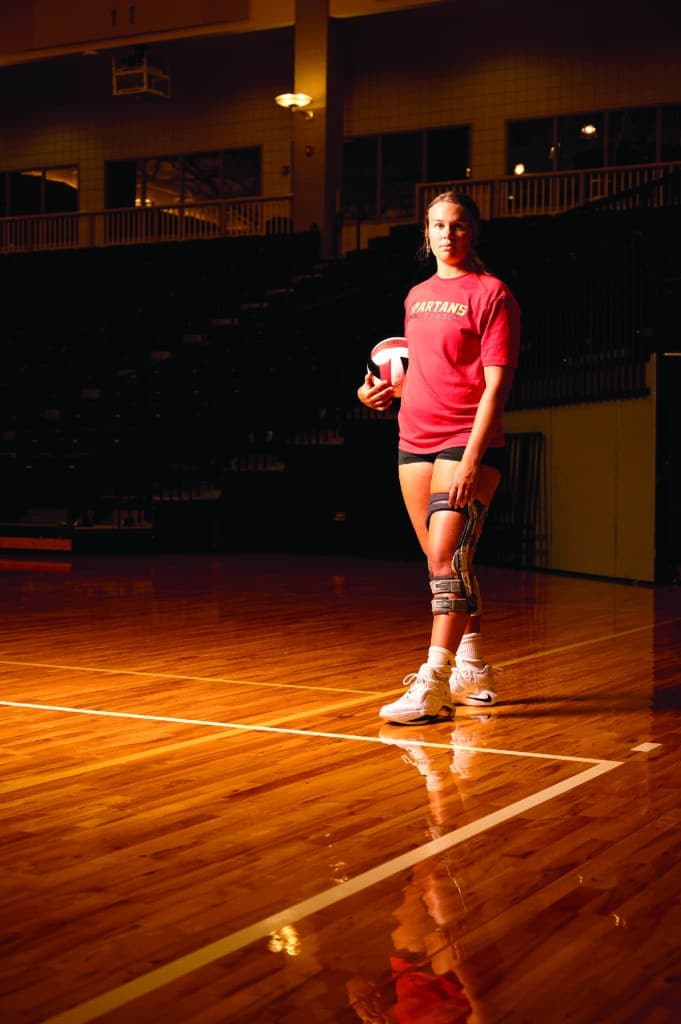
Peachtree Corners Magazine (PCM) connected with Autumn to discuss her athletic commitments, her recovery process and what she’s looking forward to in her bright future.
PCM: When did you start having an interest in sports, and specifically volleyball? What drew you to that and when did you realize you had potential?
Autumn: I started Club Volleyball in the spring of my 8th grade year. I didn’t really know much about the sport besides playing it at summer camps at my school. I knew I always liked the sport, so my friend recommended I try out at a club. I tried out for A5 Pure Volleyball Club and made a team. I knew I had potential then because A5 is the #1 ranked volleyball club in the nation, and if I can make a team at A5, I could be successful anywhere.
PCM: We understand you had an injury last October while playing volleyball. What was it and how have you come out of it?
Autumn: On October 1, 2020, we were playing Mill Creek, in the fourth set of the game. I landed wrong on my left leg and instantly collapsed and passed out. The MRI showed that I tore my ACL, tore both the medial and lateral meniscus, tore my MCL and fractured my tibia. I had surgery done at Resurgence Orthopedics by Dr. Morris, and I currently do physical therapy at Advanced Rehabilitation with Evan.
Now in July 2021, I’m able to play volleyball again. In my spring 2021 track season, I began to throw again for track after going to intensive physical therapy three times a week, two hours each session. I was able to place third in State AAA for discus, win my sectionals in track and break a school record, as my coach says, “with one leg.”
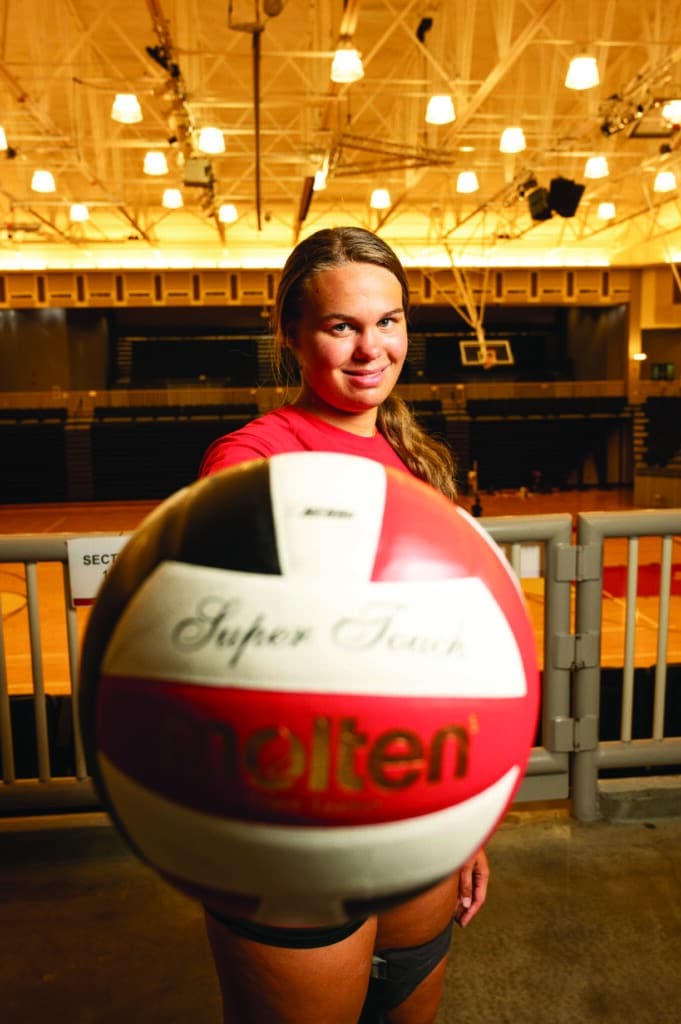
PCM: During that time, did you feel like recovery was going to be challenging? How did you work your way through that? How did you encourage yourself?
Autumn: I definitely didn’t fully comprehend the time commitment this injury required. I told my doctor I would be back in three months, but I was definitely wrong. I had to talk to my parents a lot about my struggles and they helped me get through it emotionally.
I encouraged myself to stay physically fit and to become better by watching volleyball and track meets on TV. I knew recovery would be challenging — and it still is. The worst part is being told that I can’t do something I used to excel at. I encourage myself to rehab and train every day so I can get back to doing the sports I love at an even higher level.
PCM: When were you finally cleared to compete and play?
Autumn: I was cleared to throw in track with a brace in late February. I got cleared to play volleyball in late July.
PCM: So now you play club and school sports? Which ones?
Autumn: I am on the Varsity Track team at GAC, the Varsity volleyball team at GAC and a club track team, Rockslingers. I also play club volleyball at A5 Pure Volleyball.
PCM: Do you have any particularly favorite memories over the past year or two that you’d like to share?
Autumn: My top three favorite memories where when my physical therapist allowed me to walk for the first time, and I started hobbling around the room singing. Second, I couldn’t walk because I had surgery right before my birthday, so my friends threw me a surprise birthday party; otherwise, I wouldn’t have been able to have one. Last, when I was in a wheelchair at school, I learned how to pop a wheelie.
PCM: Your busy day includes club and school sports, weight training and more. When do you have a day off? What do you do? How do you unwind?
Autumn: Every day I usually have about five hours of physical activity. I take a weightlifting class at GAC and weightlift four times a week; when track is in season, I weightlift eight times a week. My days off are typically Friday and Sundays. I use that time to hang out with friends and my family at the lake. I like to unwind by walking my dogs and watching movies.
PCM: How do you handle missing out on activities with friends because of your athletic schedule?
Autumn: I don’t often have to miss hanging out with friends, but when I do, I always try to make up time with them on my days off.
PCM: Volleyball is based on individual athleticism, but also being synced with your teammates. How is discus throwing different for you — and why discus?
Autumn: Discus is very different from volleyball because your stats speak for you, while in volleyball your skill is subjective to the viewers’ eyes. For me, discus is different because all the pressure and performance results lay on my shoulders. I started throwing discus after throwing the football with my dad in the yard. I found a knack for chucking heavy objects a long distance, so my dad recommended me to try throwing in track. I picked it up and never looked back.
PCM: When did you start that? We understand you broke GAC’s school record?
Autumn: I started discus in 8th grade. During my third full season of the sport, I broke GAC’s school discus record, that had stood since 1980, by six feet.
PCM: Now that you’re being recruited by Ivy League schools for track and field, what will you be looking at in making your decision?
Autumn: I am really looking at the academic rigor and social balance available at the schools. I want a school with a school-spirited student body in a city with lots of activity going on around me. I also want to succeed in the classroom while being pushed academically and athletically to allow me to thrive.
PCM: You mentioned that you and your dad (an aerospace engineer who flies for Delta) built your own 3-D printer and a robotic arm. How did that go? What did you end up printing? What did you take away from that experience?
Autumn: My dad and I built a 3D printer in the summer of 2019. With the printer, we were able to print out parts for a robotic robot arm. It worked really well, both the printer and robot arm. From building the printer, I became interested in the art of 3D printing and did some research on bio-printing, which is the printing of human stem cells into human parts, such as ear cartilage, all from a 3D printer. I published a paper on bio-printing in a STEM magazine, Font Femme.
PCM: Academically speaking, do you want to get into Pre-med? What’s your favorite science subject and why? And ultimately, what are your educational and career goals?
Autumn: My goal is to ultimately go Pre-med. I found my love for science in 7th grade when I dissected a frog. I was so mesmerized by the concept of anatomy that I now want to become a surgeon, possibly in cardiac or orthopedic surgery. My current favorite subject is chemistry. I love learning about what elements make up the world we live in and how we interact with them.
PCM: What is the typical “day in the life” of Autumn Clark?
Autumn: On a school day in the spring, I like to get up early and study in the library before school starts. I wake up around 6:45 a.m. and drive to school, which is about 25 minutes away. I study in the library from 7:30 until school starts at 8:30 and I head to class. I had eight classes this past year.
My first class was Honors Pre-Calculus, a class I really enjoyed because of the rigor and critical thinking. Second period was AP Chemistry; it was a very small class, so it was nice to talk in small groups with my classmates. We typically had labs once a week. Third period was Honors Latin. I got to take a break from the complicated English language and learn about Latin origin and history.
Fourth period was AP Language and Composition; in this class, we wrote a ton of essays. Then I’d go to lunch. Three times a week during lunch, I’d go to the athletic trainer at GAC so he could evaluate how my rehab was going for my ACL.
Fifth period was AP US History; it’s a lecture-based class. Sixth period, I had a study hall, where I’d be able to knock out a lot of my homework. Seventh period was weightlifting class. I try to take this class every year to help me get stronger, and because it gives me a break to unwind during the stressful academic day and get out all my angst. My eighth period class was my Christianity Bible class. This class I take every year as a GAC student; it is very informational.
After school, I’d walk up to the parking lot and talk with my friends for a little bit before track practice. Then I’d head to practice, throw for an hour and a half, then go weightlift for an hour with the team.
After weights, I’d drive over to physical therapy where I’d work out for about two hours. I’d drive to club volleyball practice, which lasts until 10:30 at night, so I’d get home around 11 p.m.
Then I’d work on homework until about 1 a.m. I never stay up past 1 if I can help it, and if I couldn’t finish my homework by then, I’d wake up early and finish at the library at school. Then I’d shower and go to sleep.
A few quick questions about personal preferences
PCM: What is your favorite mealtime?
Autumn: I like dinner the best, mainly because I’m able to eat with my family and talk with them about their day. I also like how dinner itself is so versatile and there are so many options to cook.
PCM: What is your favorite food(s)?
Autumn: My favorite foods are chocolate cake, chocolate milk, steak and guacamole.
PCM: What’s on your playlist?
Autumn: I listen both Pop and Country. I have a ton of Taylor Swift and Camilla Cabello music, as well as a lot of Brett Eldredge and Jason Aldean.
PCM: I understand you skateboard a little with your friends. Any specific move you wish you could do?
Autumn: I want to pop an Air 360. At the moment, I can only land an Air 270.
PCM: Do you have a favorite book or movie genre?
Autumn: My favorite movie and book series is Harry Potter. I really like the action genre.
PCM: Is there anything else you’d like to share? Any advice for other student athletes?
Autumn: My fun fact is that I’m a certified scuba diver. For advice, one of the quotes I’ll always remember my coach saying is “You can teach skills, but you can’t teach work ethic.” Be the player that everyone knows works hard both in the classroom and on the court/field. It will pay off in the long run by building up your character for you to succeed in all aspects of life, and it will get you far in whatever career you choose.
Related
City of Peachtree Corners
Fun for a Good Cause at Curiosity Lab’s Inaugural 5K Run/Walk
Published
2 months agoon
March 18, 2025
The Charity Run/Walk will be part of Curiosity Lab’s annual Criterium event
Expect a day of thrilling races and family-friendly fun at the inaugural Curiosity Lab Charity 5K Run/Walk followed by the Curiosity Lab Criterium on Sunday, April 27.
The day-long community event will kick off at 8 a.m., when registration opens for the 5K. The race will start at 9 a.m. and end at 10:30 a.m., and the Criterium will begin at 11:15 a.m.
In addition to the running and cycling events, there will also be kid’s races, food & beverage vendors, a kids zone, a DJ spinning tunes and more fun throughout the day.
The Charity 5K Run/Walk
Presented by Werfen and Sidel, with additional support provided by Atlas Collaborative and the City of Peachtree Corners, the Charity 5K Run/Walk will benefit the American Leukemia and Lymphoma Society and 100% of the registration fees will be donated.
While no prizes will be given for the race, bib timing will be used for those who would like to see their times. And each registrant will receive a Curiosity Lab Charity 5K Run/Walk t-shirt for participating.
Registration for the 5K is open now.

Curiosity Lab Criterium
Following the 5K, hang around and experience the Curiosity Lab Criterium, part of U.S. Pro Cycling’s Speed Week.
Speed Week is a premiere week-long event on the U.S. Pro Cycling Circuit that draws cyclists from around the world, including Olympic medalists and world and national champions. In 2024, the professional men’s and women’s events drew cyclists from over 30 states and more than 20 countries.
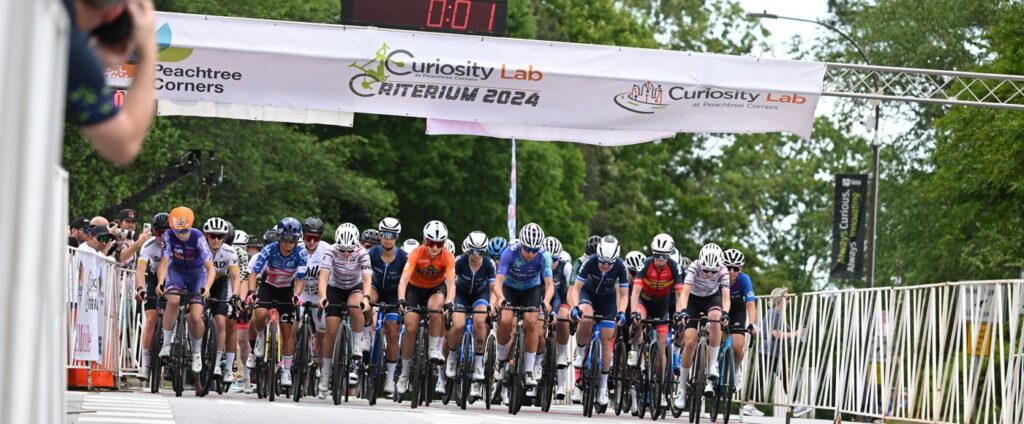
Join in the excitement and watch as some of the world’s top male and female Criterium Racers tackle the most challenging track on the circuit.
The details
The 2025 Curiosity Lab Criterium & 5K will take place on a course located within the world-famous Curiosity Lab at Peachtree Corners — a 5G-enabled, 500-acre living laboratory ecosystem designed specifically as a proving ground for IoT, mobility and smart city emerging technologies.
Location: Curiosity Lab at City Hall • 310 Technology Pkwy NW, Peachtree Corners
Date and time: 8 a.m. to 8 p.m. The 5K starts at 9 a.m and ends at 10:30 a.m. The Criterium begins at 11:15 a.m.
Parking for the event will be located at 400 and 420 Technology Parkway, Peachtree Corners.
For more information, visit peachtreecornersga.gov.
Related
Community
Recreational Soccer Club Celebrates 50 Years of Play
Published
4 months agoon
January 4, 2025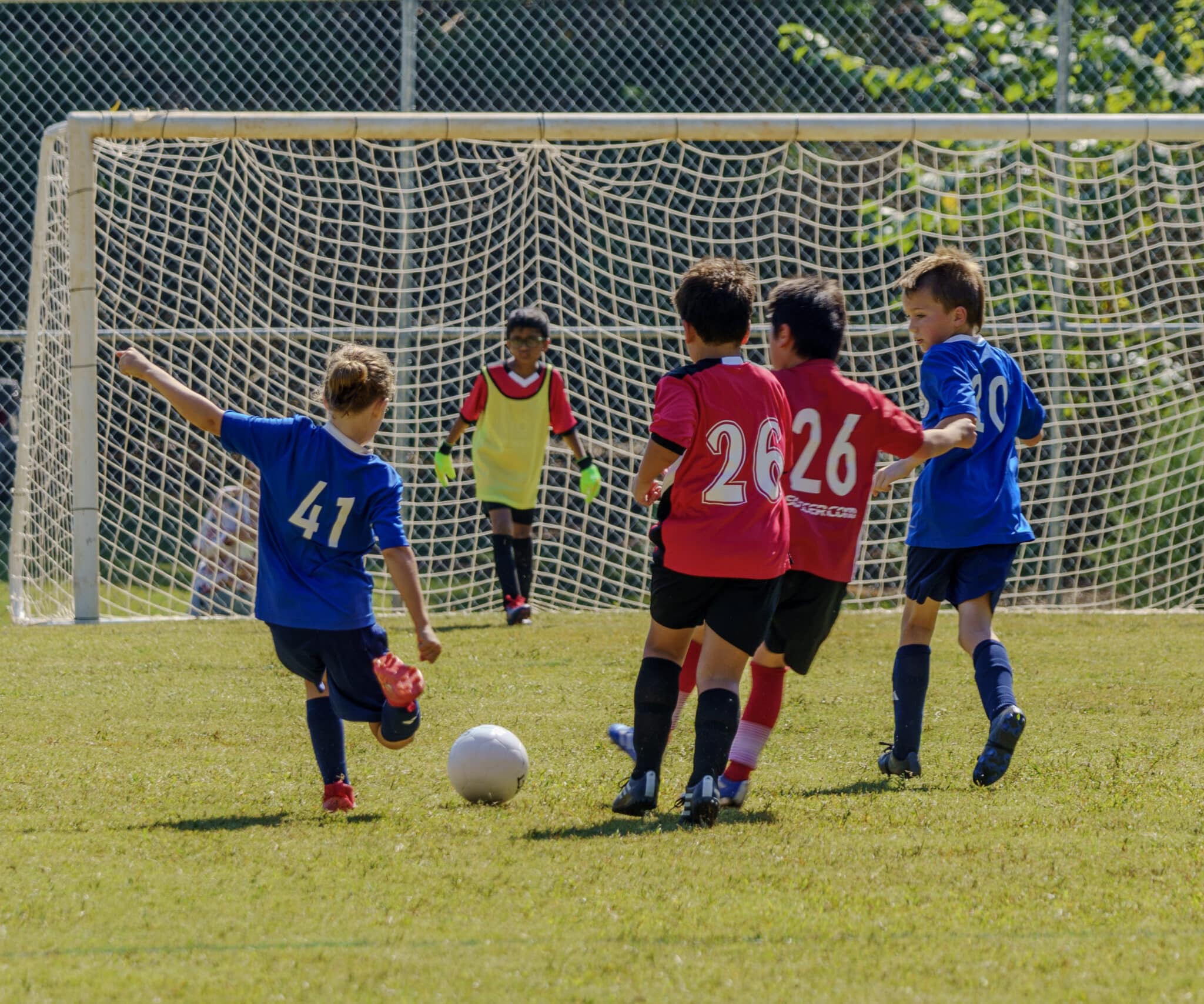
According to physicians, educators and child psychologists, there are myriad reasons parents encourage their young children to play soccer:
- Physical fitness: Soccer is a fast-paced sport that can help improve cardiovascular health, muscular strength, flexibility and endurance.
- Motor skills: Soccer involves running, kicking, dribbling and passing, which can help develop balance, agility and coordination.
- Socialization: Soccer can help children make friends from different backgrounds and cultures.
- Teamwork: Soccer is a team sport that teaches children the value of cooperation and working together towards a common goal.
- Life skills: Soccer can help children develop discipline, perseverance and resilience.
- Emotional intelligence: Soccer can help children develop empathy and emotional intelligence.
- Stress reduction: Playing soccer can help reduce stress and anxiety by releasing endorphins that elevate mood.
- Confidence: Consistent practice and dedication can help children build confidence and overcome obstacles.
- Gender equality: Participating in sports like soccer can help break down gender stereotypes.
- Enjoyment: Soccer can help encourage children to enjoy their childhood and stay in school.
It’s for those objectives and more that members of the Peachtree Corners Football Club (PCFC) are working so hard to sustain and grow their program.
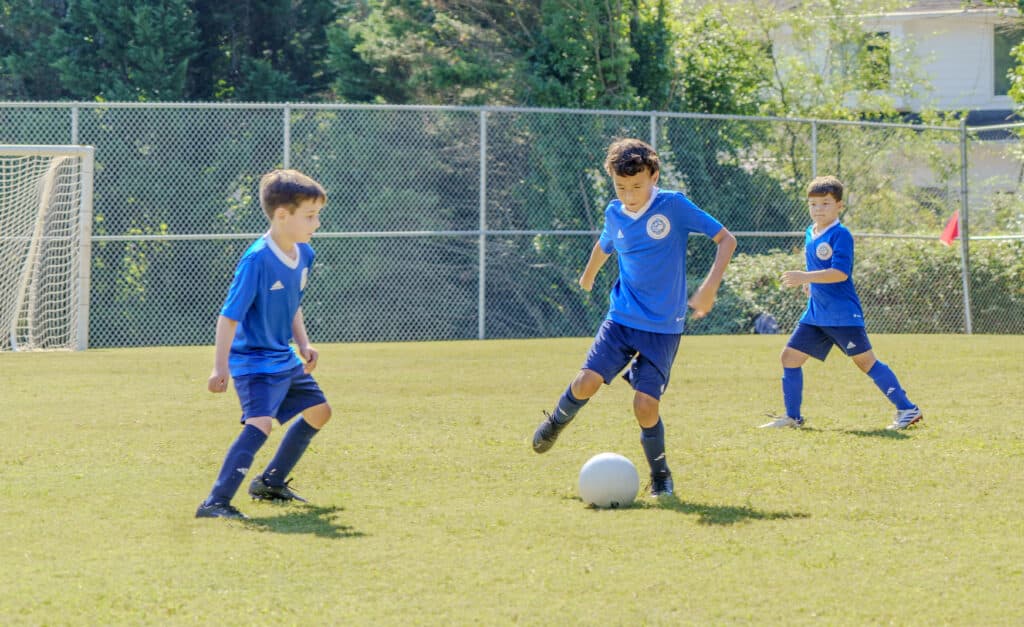
A growing community
Nearly three years ago, three local parents had the idea to build an organization for their children to reap the benefits of recreational soccer.
“We found out that we were linked to the athletic club called Peachtree Booster Club,” said Gavin Meech, a club committee member, parent coach and member of the small group that revitalized the soccer program. “It’s sort of an overarching group that also looks after the roller hockey at Pinckneyville Park in Norcross.”
They realized that back in 1975, a youth soccer program called the Jones Bridge Soccer Club was formed at Jones Bridge Park. Now renamed the Peachtree Corners Football Club, the parents decided to put the time and energy into revitalizing — and growing — the decades-old program.
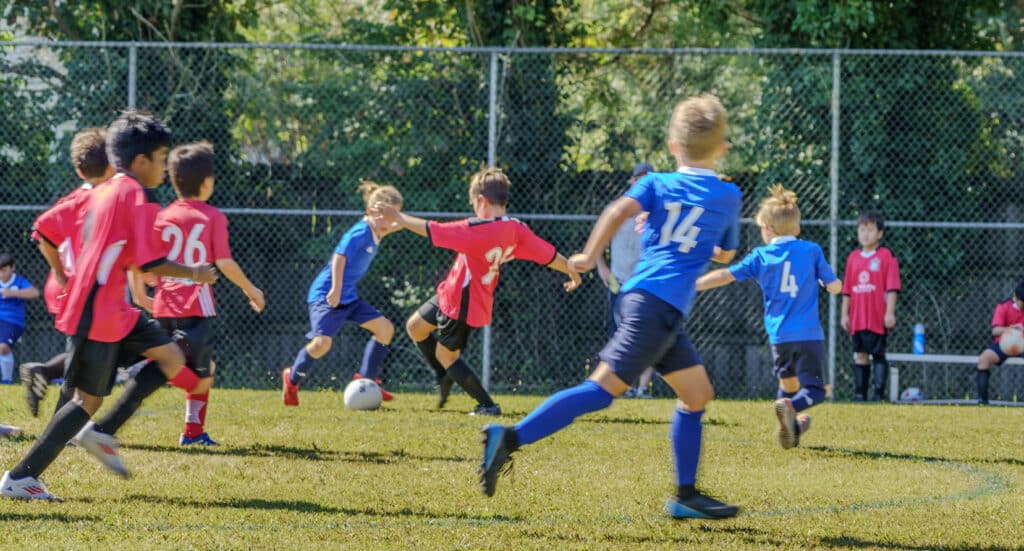
In February 2022, the three coaches had 170 kids. The program now has nearly 300 kids across 30 teams. The club emphasizes community involvement, with over 5,000 volunteer hours annually from parents and coaches. Challenges include managing growth and ensuring sustainability, though the club aims to expand its field space and engage more local businesses for partnerships.
The organization will soon celebrate 50 years of providing youth recreational level soccer to the local community in the southwest corner of Gwinnett County. And registration for the upcoming season is nearly full, highlighting the need for continued community support and involvement.
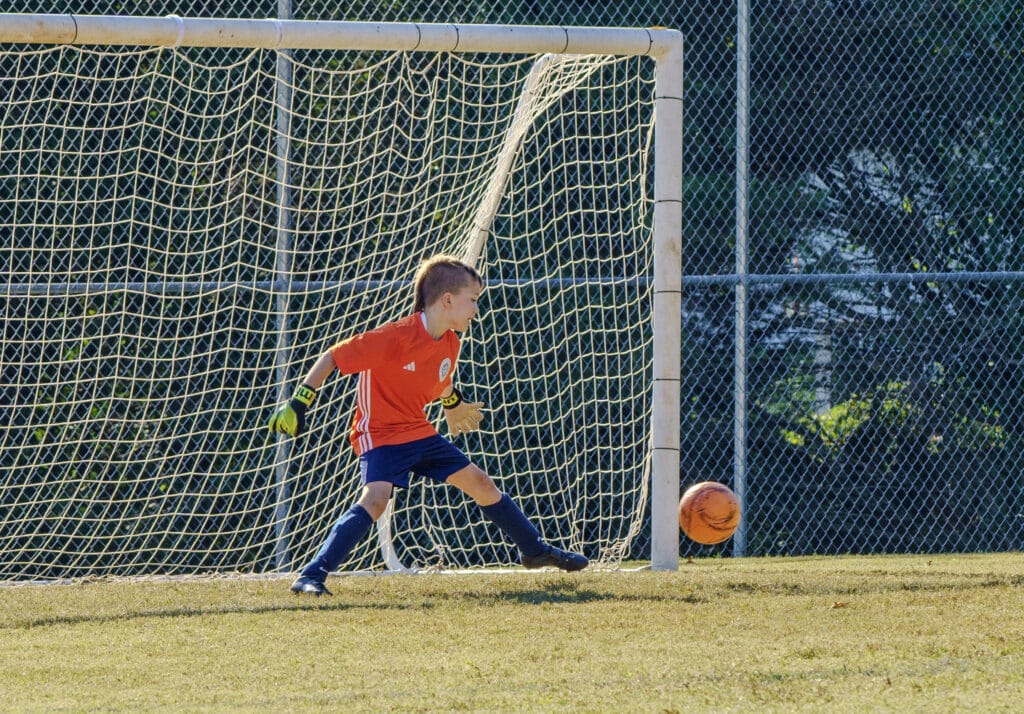
Bringing new energy to an old club
Initially, the group faced challenges in forming the soccer club, including linking with the Peachtree Booster Club and learning administrative tasks.
“That first season was a steep learning curve, and we ended up, I think, with about 170 kids,” said Meech. “So we were driving around Peachtree Corners, sticking the little signs anywhere that we were legally allowed. A few of us were grabbing anybody that would slightly suggest they would help by being a parent coach and things like that.”
Fast forward to this past season where there were just under 300 kids and 30 teams.
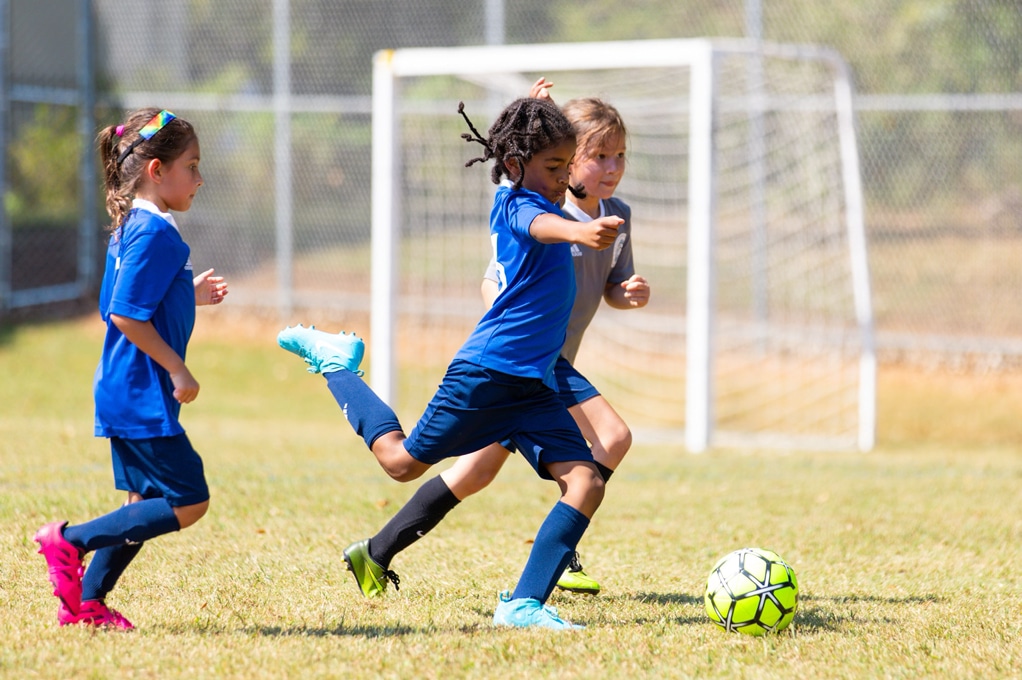
“We are now oversubscribed,” he added. “Our return rate is in excess of 80% of the kids and their families. So, it’s really become something that once they join, they return, and through word of mouth, more want to join.”
The club is community-centric, with kids from local schools like Simpson, Berkeley Lake and Cornerstone taking part. Volunteers naturally step forward and get involved, with no formal process.
“[Rapid growth] is a great problem to have. So we’re working with [Gwinnett County Parks and Recreation] at the moment to try and see if we can gain more field space,” Meech said. “We started to utilize the big field near the Aquatic Center. It’s similar in size to Jones Bridge field, but it’s got a slightly different classification at the moment.”
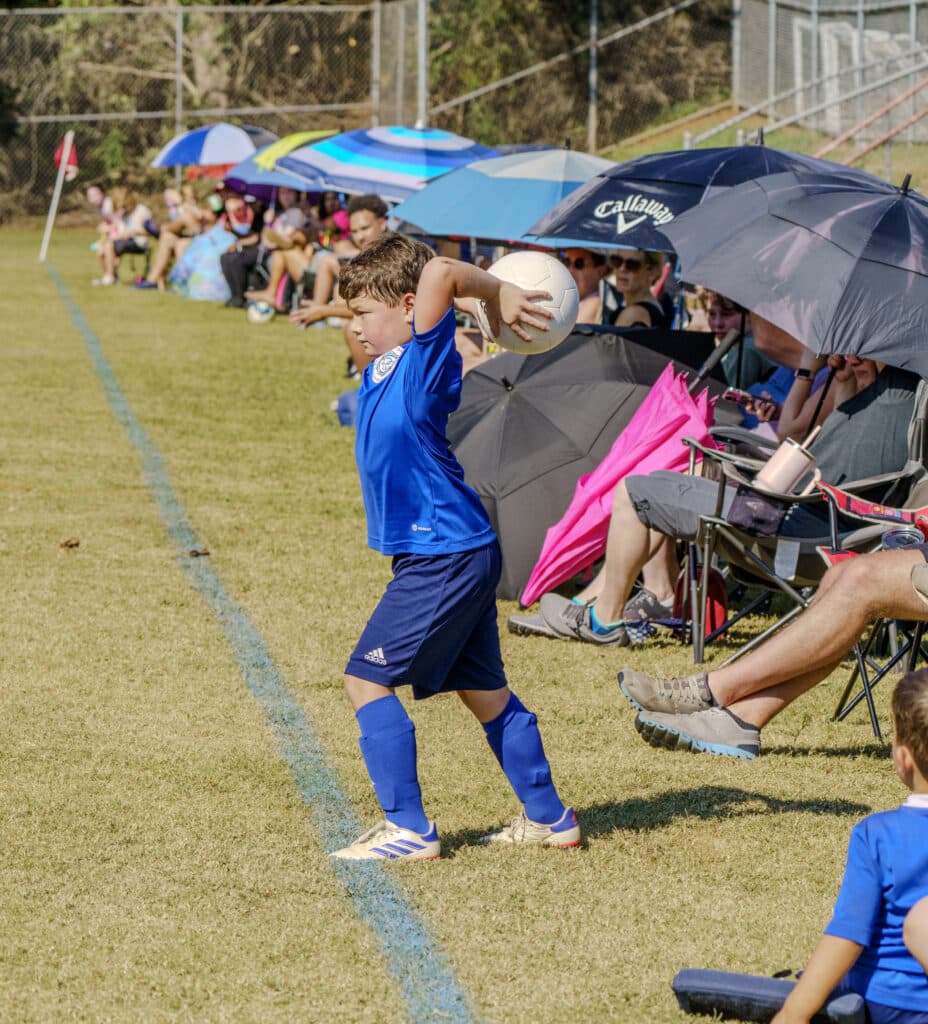
Right now, several clubs are using that space, so a huge obstacle is finding some place to play that’s local so that families won’t have to traipse all over the metro area.
“We don’t want to lose our identity by expanding too big, because that’s hard to manage,” he added.
Community engagement and future plans
Committee member Mathew Shamloo credits Meech with pulling him into the mix.
“I’d say that Gavin has a very unassuming gravitational pull,” he said. “There’s no real process to it. I think it’s just naturally the people who want to be involved step forward and, whether or not they are asked, they’re just kind of pulled in inch by inch.”
Shamloo is also a coach, but had no prior experience.
“I had no real ties to soccer before this,” he said. “My daughter wanted to play. My background is in basketball.”
So he utilized some of the fundamentals that apply to any team sport and researched best coaching practices.
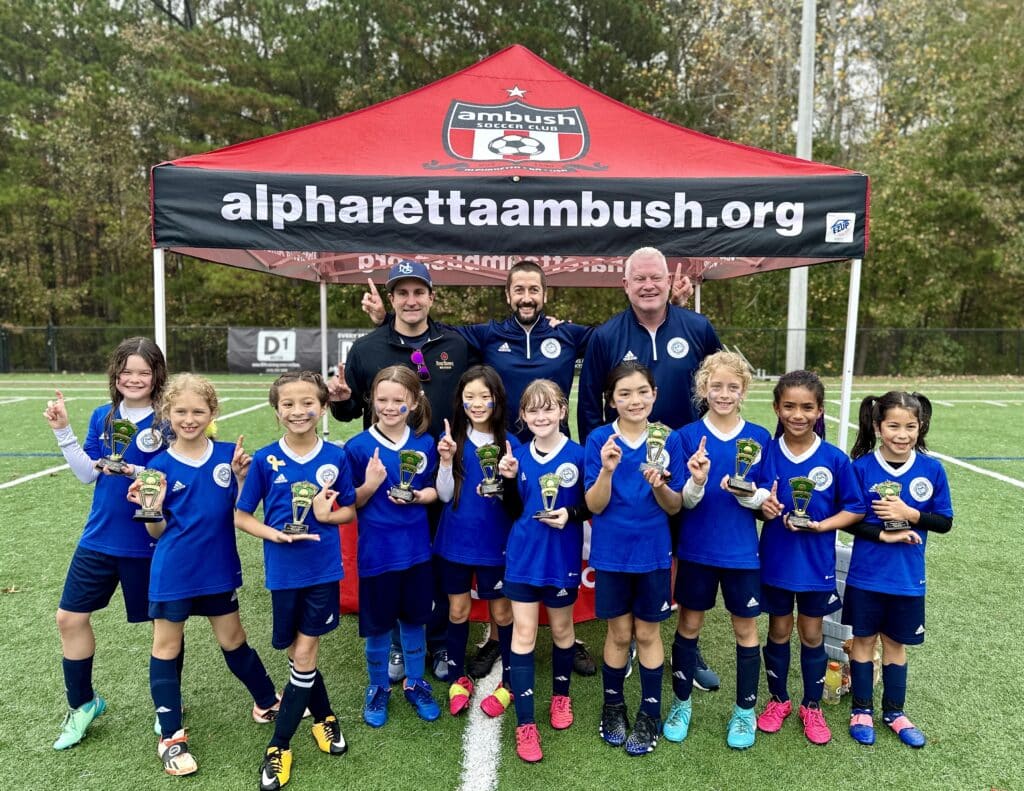
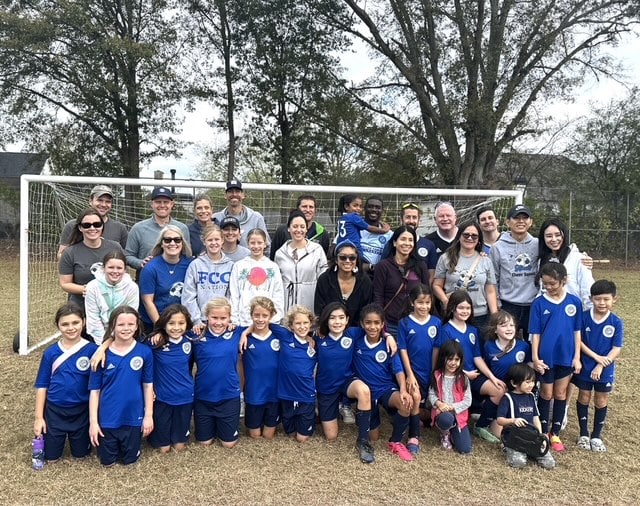
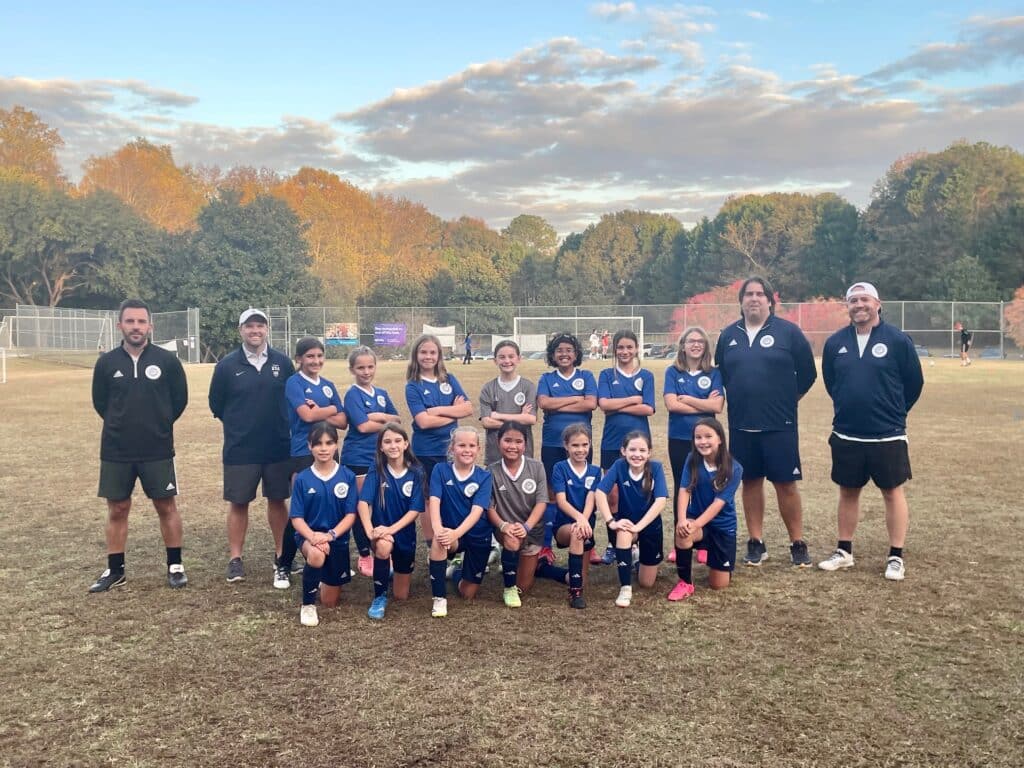
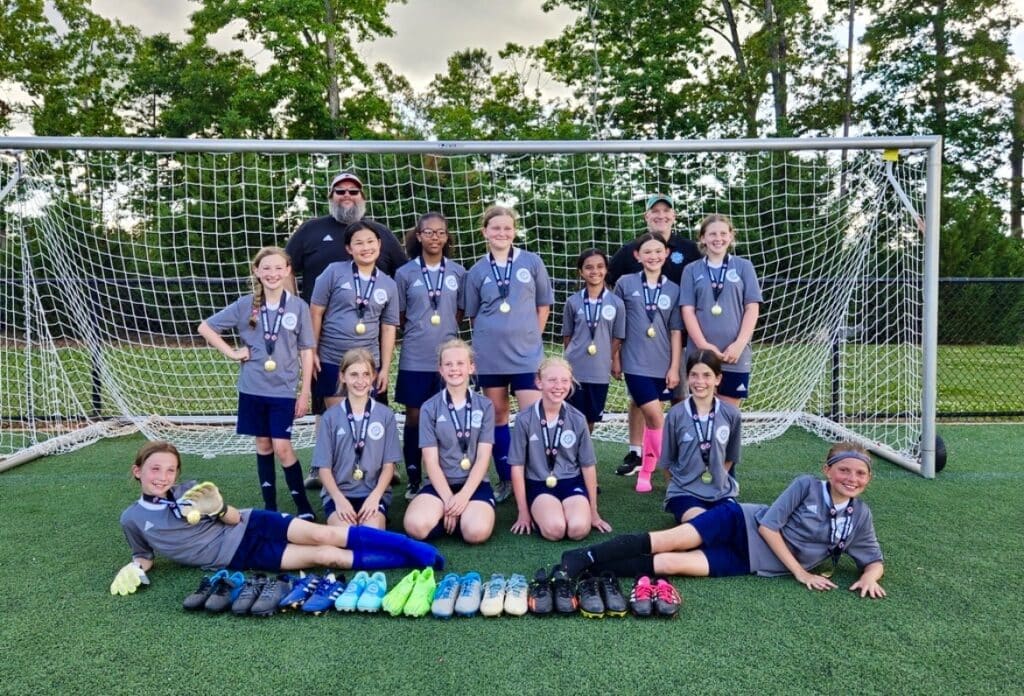
“I want her to play soccer because it’s easily accessible, it’s local, it’s right around the corner from us,” he said. “It was like, ‘Hey, there’s soccer. We can start there.’”
Like most parents, Meech and Shamloo don’t have dreams that their kids will turn into David Beckham or Brandi Chastain. But if the kids have those aspirations, PCFC has ties to bigger opportunities.
“I think what we’ve managed to achieve is we have raised the bar on rec sports, and we are able to compete, but we’re fundamentally a rec club,” said Meech. “I think some of the challenges of the past [are] where you get to a point where you say, ‘Well, should we become an academy? Should we offer the next level of competition to the kids?’ But sort of the mentality we’ve had, and kind of our foundation, is no, that Peachtree Corners is a local rec club.”
In order to keep doing what they do in an amateur Ted Lasso fashion and stay around for another 50 years, the club focuses on community and engagement with local businesses for partnerships rather than sponsorships.
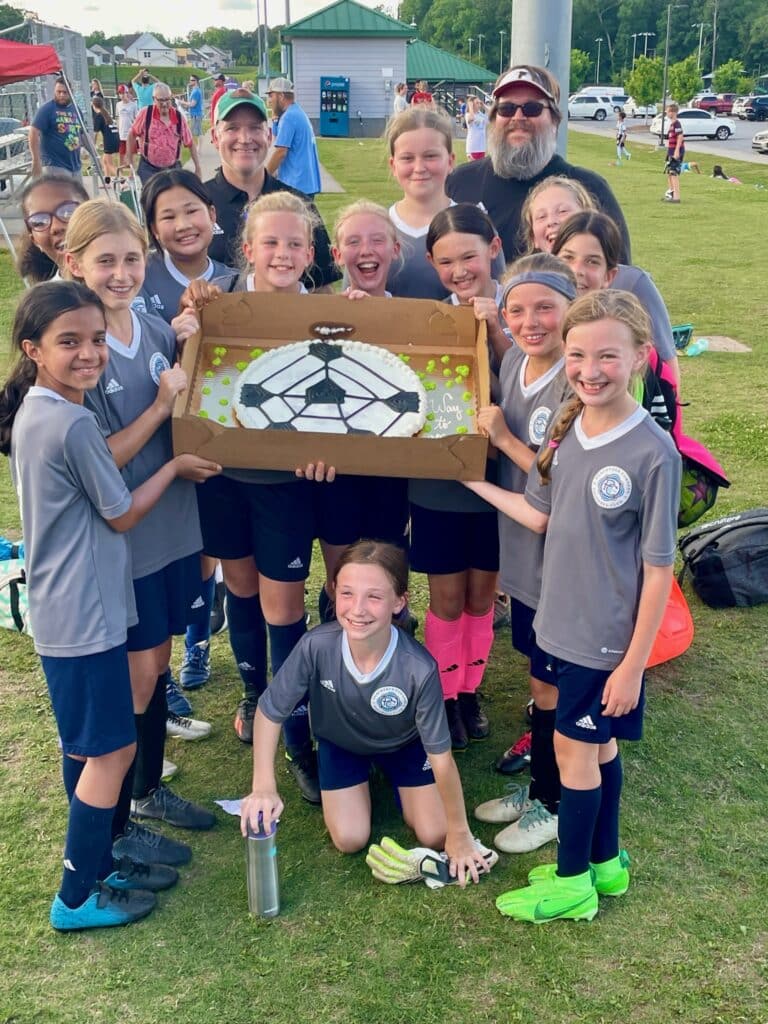
“Our soccer club and families are more than just a group of people that meet for our kids to play a sport,” said Meech. “Traditionally, you engage with local business for sponsorship, but we’re very lucky in the sense that, as a nonprofit supported by parks and rec with facilities, we don’t need a huge amount of sponsorship.”
Expanding the community
Soccer is easily accessible globally because all you need is a ball and a goal and some grass or something similar, so the costs are relatively low, he added.
“We’ve been able to engage with local restaurants, other sporting facilities and work in more of a partnership with them to create this wider community beyond Jones Bridge soccer playing fields,” he said.
Both men pointed out that they go to Town Center or other sporting events with their families and inevitably bump into Peachtree Corners FC players and family members everywhere.
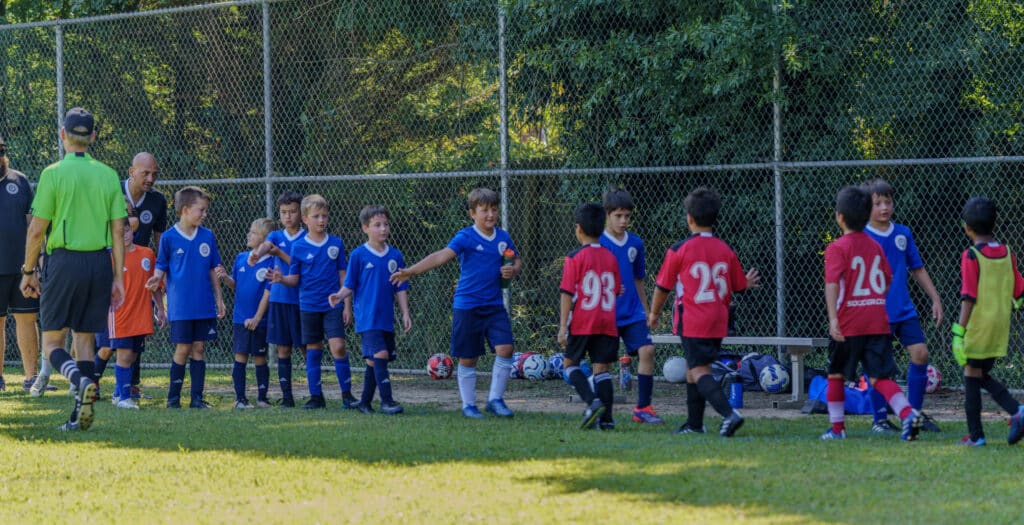
“Local businesses reach out to us and try and find out how they can contribute,” said Meech.
Although the club is at capacity, it still invites families and businesses to visit and see the activities firsthand. The committee members want to build awareness and community involvement, as the club aims to continue growing and providing a positive experience for all involved while maintaining its community-centric focus.
For more information about the Peachtree Corners Football Club, visit pcfcsoccer.com.
Related
Community
Life in Motion: The Gift of Organ Donation Fuels Active Lives for Recipients
Published
5 months agoon
December 6, 2024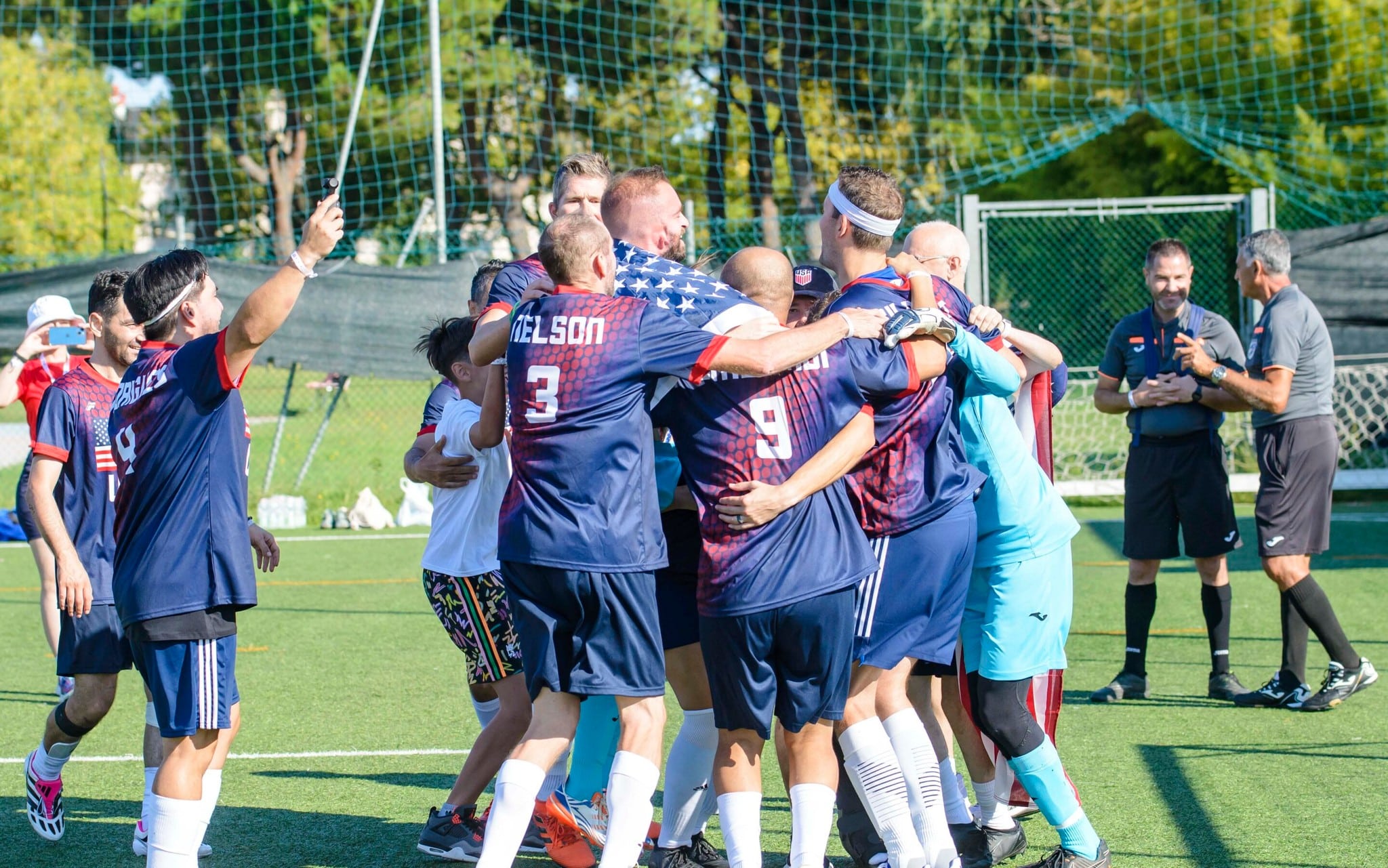
Peachtree Corners resident, Alex Everett traveled to Italy this past September — not as a tourist but as an athlete. The 28-year-old accountant and liver transplant survivor, served as goalkeeper on Team USA as they competed in the first-ever Transplant Football World Cup.
The event — part of the larger World Transplant Games — promoted giving the gift of life through a week of connection and sportsmanship, showcasing how people with organ transplants can live a normal, active life.
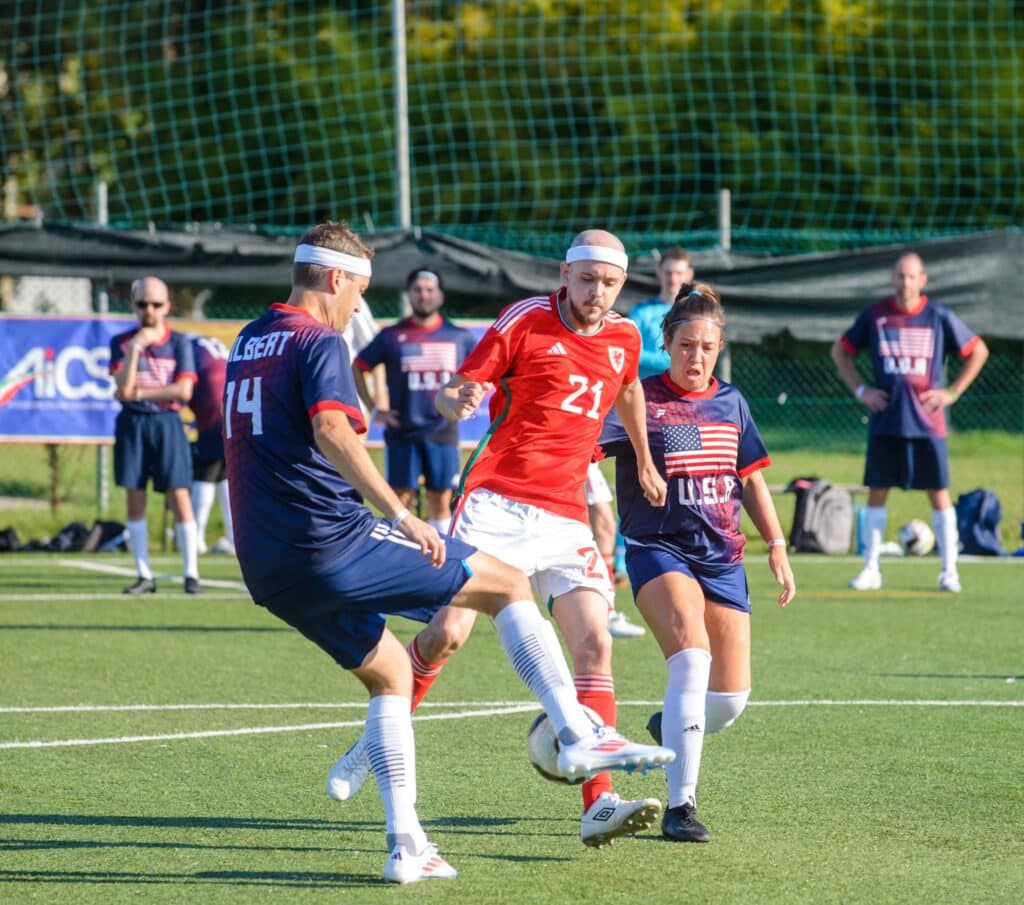
“I first heard about the US Transplant World Cup team a few years ago through a social media post,” said Alex. “The first Transplant World Cup was originally going to take place in 2022 but was postponed due to the uncertainty around international travel and COVID. Fast forward to 2024 and Team USA had an interest meeting via Zoom to discuss details about the tournament and fielding the American team.”
Team USA
All together, they had 14 people from around the United States (hailing from Georgia, Ohio, New York, New Jersey, California and Hawaii) join the team, which traveled to Cervia, Italy in September to compete.
“There were 10 other countries that were represented in the World Cup, and we were split into two groups, one of five and one of six,” Alex explained.
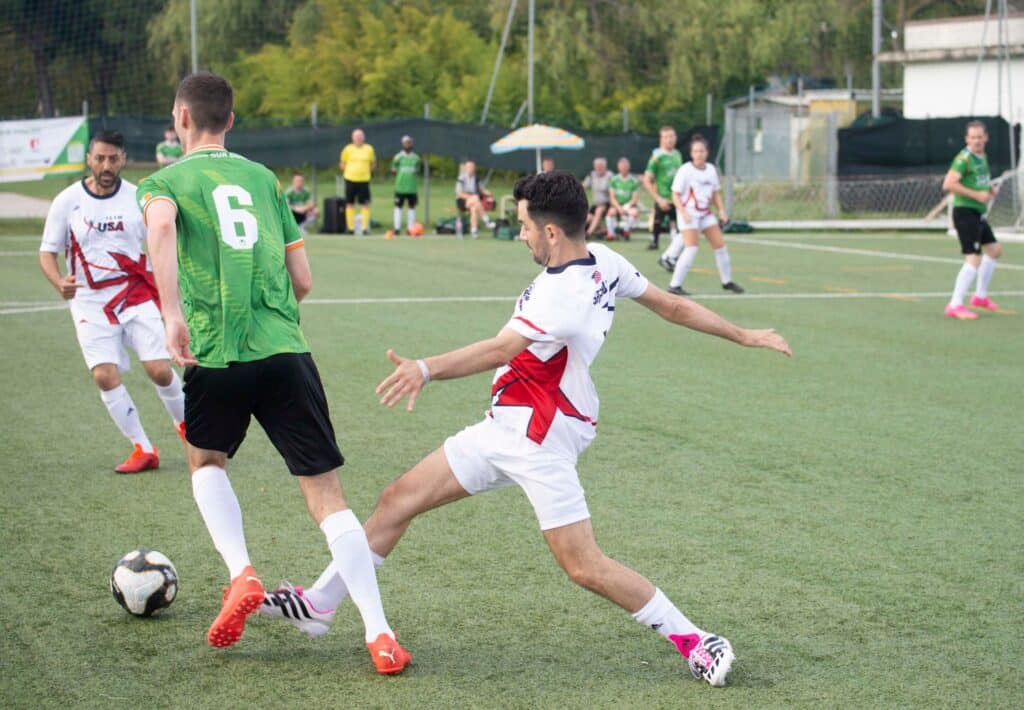
“It was an incredible experience representing the US at an international level, competing against other transplant recipients from around the world. We not only were able to share our passion for soccer but also our stories of transplantation and what obstacles we had to overcome to be where we were.”
Coming together to compete
Team USA played well in their matches but placed 9th out of the 11 teams. Because players came from all over the country to join the team, they hadn’t had the opportunity to practice together — or even meet in person — before the tournament started.
“The first time we met face to face and kick a ball as a team was our first game against France,” said Alex. “While that outcome was not what we wanted, we progressively got better as the tournament went on. Eventually ending with a win in a penalty shoot-out against Wales and a normal time win in our final game against Northern Ireland.”
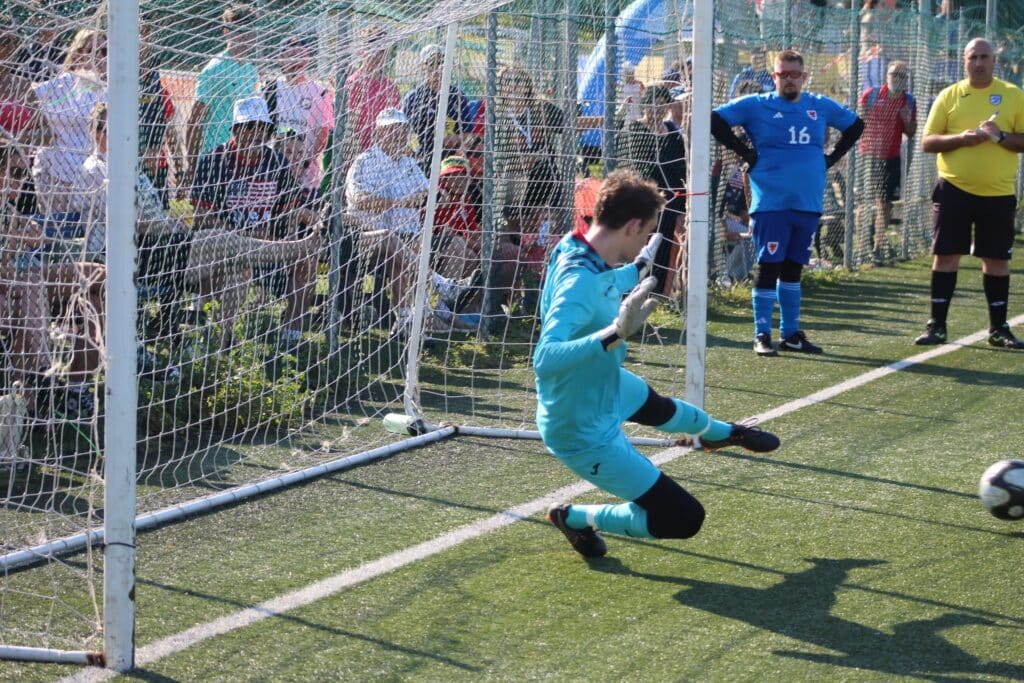
“It was an incredible experience, and I would highly recommend anyone who’s involved with transplantation to reach out and get involved with not only Team USA but also with the Transplant Games of America (TGA), which is an Olympic-style competition for people who have received transplants or living donors,” he added.
Most states in the US have their own TGA team, including one here in Georgia.
World Transplant Games 2025
The next World Transplant Games will be held in Dresden, Germany on August 17-24, 2025.
Over six days, athletes and teams from 60 countries will meet to compete in 17 different sports. The US Team is excited to be part of it again and are currently looking for more players interested in taking part.
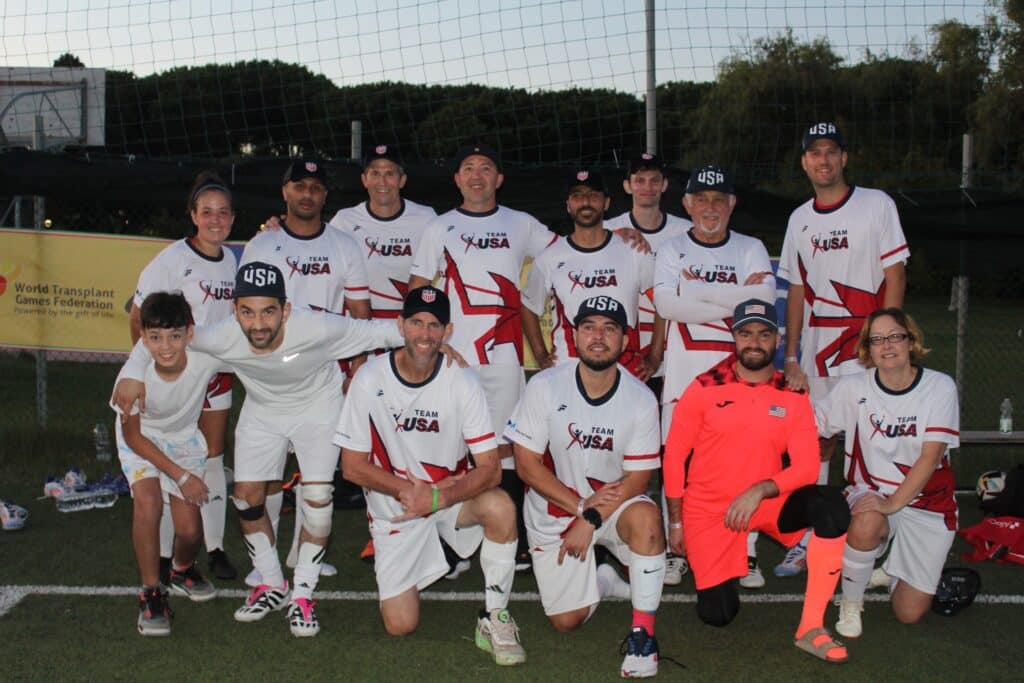
Leave a lasting legacy
Alex is also involved with the Peachtree Corners-based organization LifeLink® of Georgia, a division of the LifeLink® Foundation.
Established over 40 years ago, the foundation’s mission is to inspire new organ donor registrations and celebrate those who have decided to save lives as a registered organ, eye or tissue donor. The mission is carried out locally through education programs and community awareness campaigns.
Earlier this year, LifeLink of Georgia launched The Infinity Campaign, a state-wide educational effort aimed at motivating and registering new organ donors. The campaign is represented by the infinity symbol, to demonstrate the lasting impact of organ and tissue donation.
About LifeLink of Georgia
LifeLink of Georgia partners with hospitals to support and guide families as they establish their loved one’s legacy through organ and tissue donation.
They carry out the decisions of registered donors or their families and honor the life of each donor by providing organs and tissue for transplant to as many patients as possible.
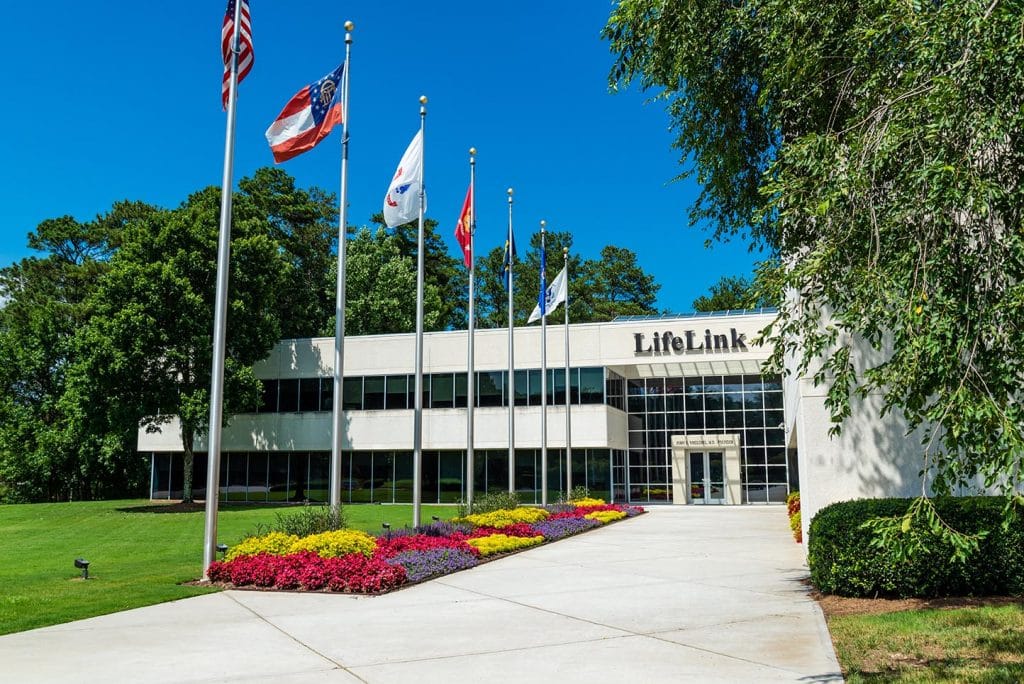
In 2023, 457 men, women and children gifted a legacy of life through organ donation with LifeLink of Georgia, yet there are still nearly 3,000 patients in the state awaiting an organ transplant and thousands more that could benefit from tissue transplantation.
“When you become an organ donor, your life story continues through the lives you save, ensuring that your legacy lives on indefinitely,” says Katie Payne, executive director, LifeLink of Georgia. “Life is an invaluable treasure, a lesson we learn anew each day from our donor families. Thanks to their generosity, LifeLink of Georgia saves thousands of lives every year, and we are deeply honored to continue this extraordinary mission.”
The Infinity Campaign
The Infinity Campaign features a series of real stories from registered donors, each telling what inspired them to register and emphasizing the effect this decision has on saving lives. By sharing these stories, LifeLink aims to motivate more people to register as organ, eye and tissue donors and spread the message of hope and life.
“The decision to become a donor was deeply personal. It is an opportunity to give the ultimate gift — the gift of life,” said Adán Bean. “I get to continue to tell the story for others, be a little bit of ink in their pen and help them write what they want to write.”
As part of the launch, LifeLink has created the website mystorycontinues.com, which spotlights stories from donors and recipients and offers innovative tools, including the opportunity to upload a photo to share your support and spread the word on social media about the importance of organ, eye and tissue donation.
Become a donor
Being a donor is an incredible way for individuals to make a difference and have an impact on the lives of others. One organ, eye and tissue donor can potentially save or improve the lives of more than 75 people.
The need for organ and tissue donors is greater now than ever, given the growing numbers of people on transplant wait lists and increasing numbers of people with diabetes and kidney disease.
Currently, there are about 3,000 people in Georgia on the organ transplant list and thousands more on the tissue transplant list.
There are several simple ways to register your decision to be an organ, eye and tissue donor:
- Visit mystorycontinues.com and sign up today.
- Register when renewing or receiving a driver’s license or identification card at the Georgia Department of Driver Services.
- Register when obtaining a hunting or fishing license through the Georgia Department of Natural Resources.
For more about LifeLink of Georgia, visit lifelinkfoundation.org/our-story/#llgeorgia.
Related
Read the Digital Edition
Subscribe
Keep Up With Peachtree Corners News
Join our mailing list to receive the latest news and updates from our team.
You have Successfully Subscribed!

Katherine Lafourcade — A Journey of Passion, Resilience and Giving Back

GA Tech Launches First-of-its-Kind GT Atrium in Peachtree Corners

Digital Edition

PCBA Announces 2025 Scholarship Winner

Paul Duke STEM High School Student Earns CGO Scholarship

World Blood Donor Day Starts Here: Theo’s Miracle, Katherine’s Mission [Podcast]

Official City Merchandise Line Debuts This Saturday at Town Green

Peachtree Corners Grows Business Opportunities Through Economic Development

City of Peachtree Corners Awarded Certificate of Achievement From GFOA for Seventh Straight Year

Simpson Elementary Marks Exceptional Children’s Week

Executive Function: A Tribute to Working Moms

Official City Merchandise Line Debuts This Saturday at Town Green

Peachtree Corners Grows Business Opportunities Through Economic Development

Digital Edition

World Blood Donor Day Starts Here: Theo’s Miracle, Katherine’s Mission [Podcast]

Paul Duke STEM High School Student Earns CGO Scholarship

Light up the Corners [Video]

Capitalist Sage: Business Leadership in Your Community [Podcast]

Cliff Bramble: A Culinary Adventure through Italy

Top 10 Brunch Places in Gwinnett County

A Hunger for Hospitality

THE CORNERS EPISODE 3 – BLAXICAN PART 1

Top 10 Indoor Things To Do This Winter

The ED Hour: What it takes to Remove Barriers from Education

Peachtree Corners Life
Topics and Categories
Trending
-
Digital Edition5 days ago
Digital Edition
-
Podcast5 days ago
World Blood Donor Day Starts Here: Theo’s Miracle, Katherine’s Mission [Podcast]
-
City of Peachtree Corners3 days ago
Official City Merchandise Line Debuts This Saturday at Town Green
-
Business3 days ago
Peachtree Corners Grows Business Opportunities Through Economic Development







